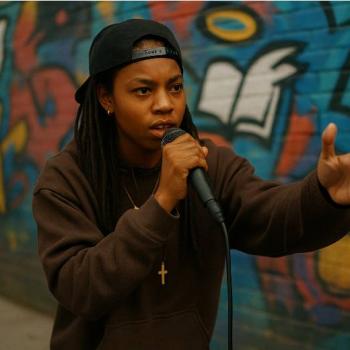A fourth week Ashley will be seated with a couple of thousand other people in a nondenominational megachurch. In this megachurch, Ashley will not be subjected to a lengthy introduction of a guest speaker that lists their education credentials, because this church will not consider a formal theological education necessary for a speaker to preach moving, relevant, humorous sermons that pack people into the sanctuary every week.
The fifth week Ashley will be seated in the small church where I met her in the summer of 2010. She and her family will be seated with her parents halfway back on the right. Just the right distance to be able to see the PowerPoint presentation on the big screen. Rather than an inductive, eighteen-minute sermon, the family will experience a forty-minute "teaching" sermon, a march through a theme, text, or doctrine with a minimum of six bullet points. After Church, in a déjà vu flashback to the 1950s, her father will say to the children, "Any one who can name the preacher's eight points can have ice cream!
By now you have thought several times to yourself, "But all these things are already happening." On any given Sunday in this country, Protestant preaching already takes all the forms I predict our grown-up acolyte will experience in thirty years -- the blog replacing or supplementing the sermon, the simulcast sermon, the emerging (dialogical) sermon, and the lengthy, "teaching" sermon. And there are all kinds of combinations of the above.
For Ashley's sake, in 2030 I hope we realize that the blog and the simulcast, while they can enhance the physical gathering of the people of God with a real live preacher, they cannot replace it. I hope we realize that charisma cannot replace the reality of careful preparation, and that bullet points, in and of themselves, are insufficient to appeal to the mind, heart, and will.
My crystal ball is as cloudy as anybody else's, but here are some predictions for Protestant preaching in the U.S. in 2030.
Emerging Church preaching won't call itself that anymore. After twenty-plus years, you can't still be "emerging." That's like an actor trying to play a part too young for him. Emerging Churches will have developed a tradition and a body of teachings that they will feel a need to pass on. The present emerging "dialogue sermon" will swing toward a more traditional rhetorical form in which the preacher takes more of the lead and presents a more finished product before inviting response.
If trends in missional passion and environmental integrity continue among those in their 20s and 30s, prosperity preaching will have to spiritualize itself into something deeper and truer. It will need to define prosperity in spiritual terms and really mean it.
In twenty years, there will still be megachurches. To continue to appeal to the next generation, they will need to make more room in preaching and worship for participation by worshippers. Preaching will become a more overt part of small group gatherings, from Bible study to mission projects, to meet people's need for dialogue about theology and scripture beyond the worship service. Megachurch preaching will need to clarify for attendees the relationship between the sacrificial demands of discipleship and the self-indulgent cravings of suburban upper-middle-class American culture.
Missionary preachers from Latin America, India, Africa, and Asia will influence North American preaching, bringing the oral culture and vibrant faith of Christianity in their countries to bear on preaching in this country.
Churches that become missional in their evangelism rather than attractional, will find themselves among the poor and the poor among their worship services in their sanctuaries to a great degree. Preaching will be forced to honor the social nature of salvation and not continue to limit Jesus' job description to being my "personal Lord and Savior."
When Ashley informed me solemnly that I was "in her seat," she was undoubtedly right. We preachers owe it to her future self to put ourselves in her shoes as well. In twenty years, I hope the preaching she hears will embody those qualities that the best preaching throughout the centuries has embodied: passionate faith, imagination, cultural relevance, and biblical, theological depth.
For 30-year-old Ashley's sake, I hope that in 2030 preachers still strive to preach in a way that lives up to the prayer we often say before we preach: "May the words of my mouth and the meditations of all our hearts be acceptable in thy sight, O Lord." (from Psalm 19:14)
The Rev. Dr. Alyce M. McKenzie is Professor of Homiletics at Perkins School of Theology. She is the author of several books on preaching the Bible's wisdom in today's churches, including Preaching Proverbs: Wisdom for the Pulpit, Preaching Biblical Wisdom in a Self Help Society, and Hear and Be Wise: Becoming a Teacher and Preacher of Wisdom. She has also written two study guides for adult Sunday School classes: The Parables for Today and The Interpretation Study Guide to The Gospel of Matthew. Her most recent book, Novel Preaching: Tips from Today's Top Writers for Crafting Creative Sermons, was published by Westminster John Knox in February 2010. She has recently completed What Not To Say: Practical Advice for Provocative Preaching, co-authored with John C. Holbert. It will be published in 2011 by Westminster John Knox Press. Alyce is a member of the Patheos Expert Community.\




